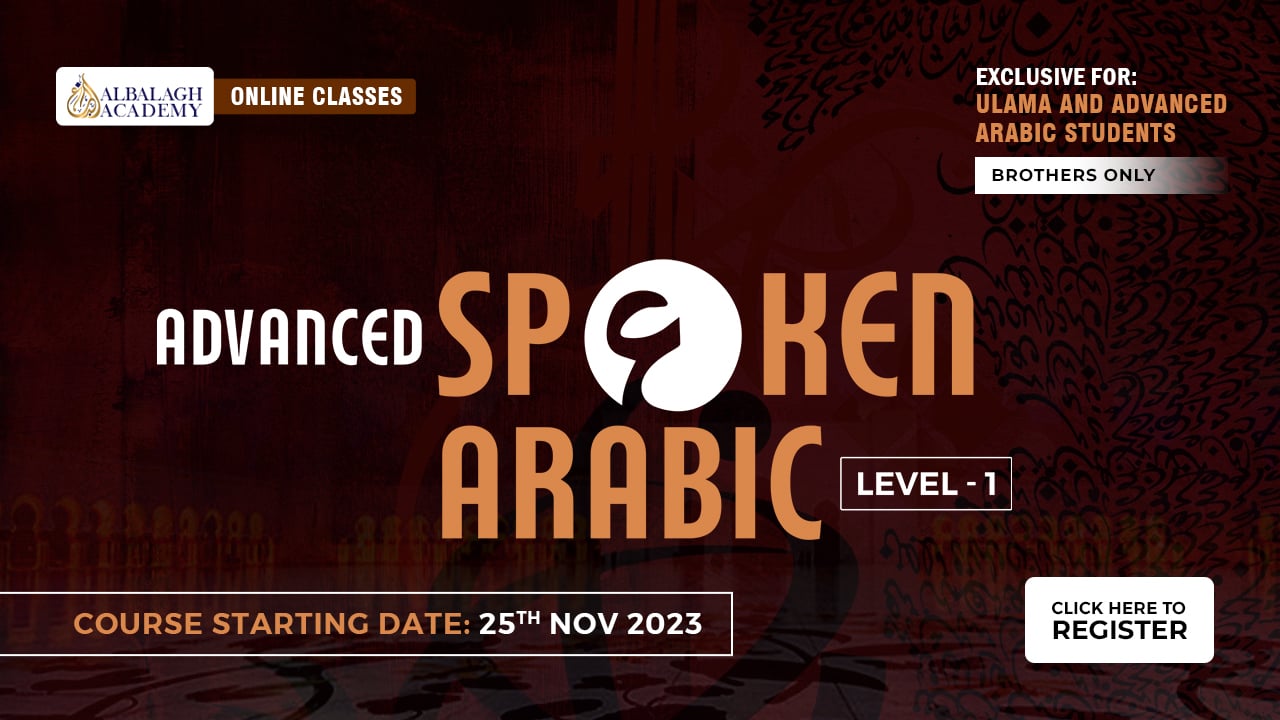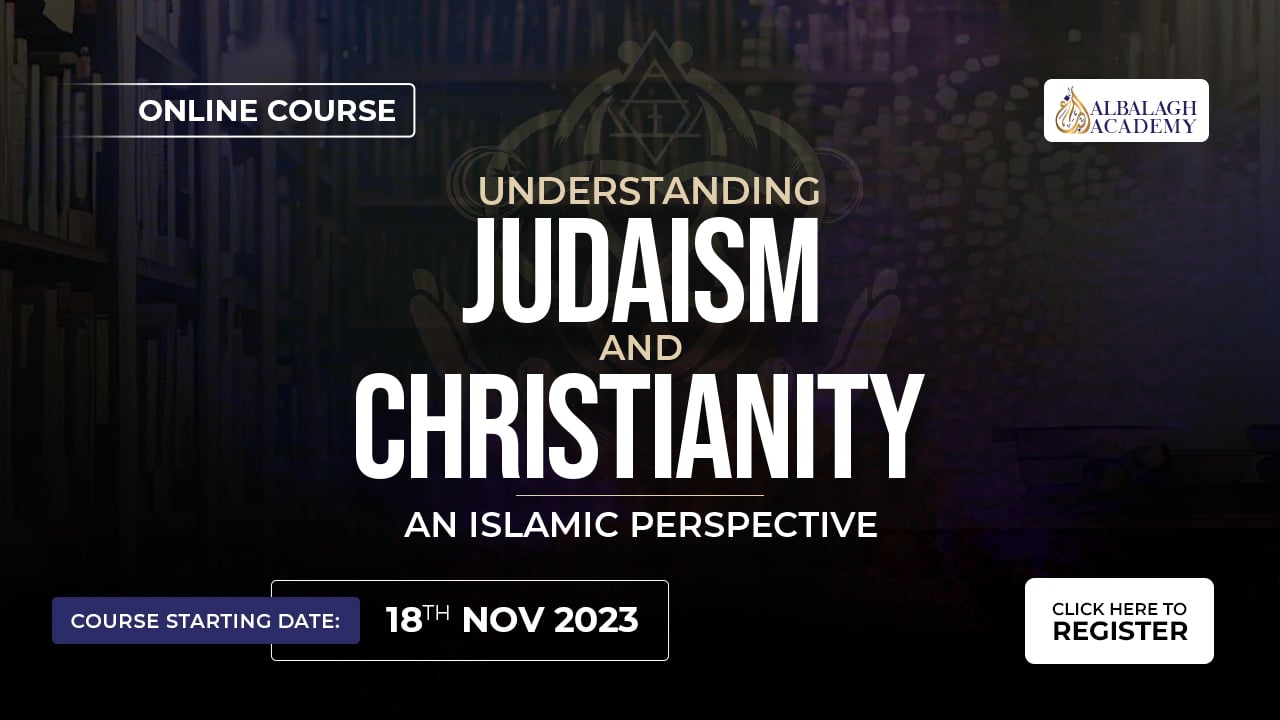Al Takhassus in Fiqh Al Muamalat al-Maliyah
(Exclusive for Ulama and Alimat)
(Accepting applications for February 2022 intake)
About The Course
Industry studies estimate that the Islamic finance industry will require as many as one million skilled professionals by next five years. Organisations yearly need 15,000+ professionals, who have a good understanding of laws and applications of Islamic finance in real life. This talent gap cannot be fulfilled with even the most experienced bankers with a conventional educational background instead; the industry requires a stream of leadership in reliable shariah scholars equipped with in-depth Islamic fiscal knowledge and practical expertise. With the growth of new economies and the rise of markets across the globe, business schools are expanding the conventional method of teaching economics and finance. Today’s varied and fluctuating markets call for finance professionals who are both flexible in their approach and knowledgeable of different financial models. We need the same in shari’a skill set.
Realising this need, the Al Balagh Academy launched Takhassus (specialisation) Islamic Banking and Finance (TIBF). This is an advanced level qualification, which produces highly skilled Shariah Scholars, who can fulfil the market demands. The programme has been customised solely for Shari’ah graduates to provide them with theoretical and applied knowledge of Islamic finance, Islamic fiscal jurisprudence, banking, Takaful and economics. Graduates of this programme will have up-and-coming career prospects in academia and the local and international Islamic finance industry.
AL-TAKHASSUS IN ISLAMIC BANKING AND FINANCE SYLLABUS
MODULE
1
Islamic Jurisprudence
Islamic Jurisprudence
MODULE
2
Islamic Banking
Islamic Banking
MODULE
3
Islamic Insurance (
Takaful)
Islamic Insurance
(
Takaful)
MODULE
4
Islamic Capital Markets
Islamic Capital Markets
MODULE
5
Shariah Audit and Compliance
Shariah Audit and Compliance
MODULE
6
Research Methodology in Economics and Finance
Research Methodology in Economics and Finance
Economics and Finance
MODULE
7
Islamic Law of contracts
Islamic Law of contracts
MODULE
8
Islamic Partnership Corporate and Securities Law
Islamic Partnership Corporate
and Securities Law
MODULE
9
Islamic Treasury Operations
Islamic Treasury Operations
MODULE
10
Islamic Wealth Planning and Management
Islamic Wealth Planning
and Management
MODULE
11
Islamic Portfolio Management
Islamic Portfolio Management
MODULE
12
Ethics and Corporate Governance
Ethics and Corporate Governance
MODULE
13
Risk Management for Islamic Financial Institutions
Risk Management for
Islamic Financial Institutions
MODULE
14
Commercial Law and Legal Documentation for Islamic
Commercial Law and
Legal Documentation for Islamic
MODULE
1
Radd ul Muhtar /Fatawa Shami
Radd ul Muhtar /Fatawa Shami
MODULE
2
An Introduction to Islamic Finance
An Introduction to
Islamic Finance
MODULE
3
Understanding Islamic Finance
Understanding Islamic Finance
MODULE
4
Meezan’s Bank's Guide to Islamic Banking
Meezan’s Bank's Guide
to Islamic Banking
MODULE
5
Fiqh al-Buyu’ – Mufti Muhammad Taqi Usmani
Fiqh al-Buyu’
– Mufti Muhammad Taqi Usmani
MODULE
6
Sharhul Majallah
Sharhul Majallah
MODULE
7
Islamic Financial System: Principles and Operations, (2016), ISRA.
Islamic Financial System:
Principles and Operations, (2016), ISRA.
MODULE
8
AAOIFI Shariah Standards
AAOIFI Shariah Standards
MODULE
9
Tamreen al-Fatawa
Tamreen al-Fatawa
MODULE
10
Maqasid Al Shariah in Islamic Finance, Lahsasna, A (2013), IBFIM
Maqasid Al Shariah
in Islamic Finance,
Lahsasna, A (2013), IBFIM
MODULE
11
Bidayatul Mujtahid Wa Nihayatul Muqtashid- Allamah Ibn Rushd al-Qurtubi
Bidayatul Mujtahid Wa
Nihayatul Muqtashid-
Allamah Ibn Rushd al-Qurtubi
MODULE
12
Fundamentals of Shariah in Islamic Finance
Fundamentals of Shariah
in Islamic Finance
MODULE
13
Sharia Advisory and Auditing
Sharia Advisory and Auditing
MODULE
14
Al Mausuah al Fiqhiyyah Al Kuwaitiyyah (Selected)
Al Mausuah al Fiqhiyyah
Al Kuwaitiyyah (Selected)
MODULE
15
Islamic Academic Research
Islamic Academic Research
MODULE
16
Islamic Economy
Islamic Economy
MODULE
17
Takaful and Re takaful
Takaful and Re takaful
MODULE
18
Islamic Financial Instruments
Islamic Financial Instruments
MODULE
19
Islamic Banking and Finance
Islamic Banking
and Finance
MODULE
20
Islamic Financial Law
Islamic Financial Law
MODULE
21
Islamic Corporate Finance
Islamic Corporate Finance
MODULE
22
Mausuat Fiqh al Maliyat Al Muasarah
Mausuat Fiqh al
Maliyat Al Muasarah
MODULE
23
Usool ul Ifta Wa Adabuhu , Mufti Muhammad Taqi Usmani
Usool ul Ifta Wa Adabuhu ,
Mufti Muhammad Taqi Usmani
MODULE
24
Al-Fiqh Wa Usul Al-Fiqh, Shaykh Zahid Al-Kawthari
Al-Fiqh Wa Usul Al-Fiqh,
Shaykh Zahid Al-Kawthari
MODULE
25
Ghamz 'Uyun Al-Basa'i Sharh Al-Ashba' Wa Al-Nazair, al-Hamawi
Ghamz 'Uyun
Al-Basa'i Sharh Al-Ashba'
Wa Al-Nazair, al-Hamawi
MODULE
1
Al Madhab Al Hanafi
Al Madhab Al Hanafi
MODULE
2
Tarikh al-Fiqh al-Islami
Tarikh al-Fiqh al-Islami
Course Overview
Islamic finance products are based on permitted economic and commercial activity, as outlined in the Holy Quran and Sunnah. Through it, we learn the permissible sources of income, the prohibiting of other types of income including riba (interest), moral directives in conducting business, unethical trade practices, charity, consumption, wealth accumulation, social responsibility as well as communal development. Islamic finance is simply the financial tools developed based on these requirements.Islamic finance is among the fastest-growing markets, and over 700 Islamic financial institutions are operating in both Muslims and Non-Muslim countries.
Many of the world’s leading emerging markets - notably the
GCC countries, Malaysia and Indonesia have significant Muslim populations, which have driven the rise of Islamic banking. Ernst and Young’s World Islamic Banking Competitiveness Report 2016 notes that Islamic banking assets have risen about 16% each year since 2010, despite general economic and political volatility. Well-established in the Middle East and select markets in Asia, Islamic banking is also a burgeoning finance model in other parts of the world, like in Europe, Islamic banking is a booming finance sub-sector.
Globally, the number of institutions offering Islamic finance degrees has risen from 141 in 2014 to 191 in 2016, according to ICD-Thomson Reuters Islamic Finance Development reports. One catalyst has been the growth of the sector. There are 1,407 Islamic financial institutions globally, from retail to investment banks and asset managers. The 2017 ICD-Reuters report put the Islamic finance industry at $2.2tn of assets in 2016 and forecast that it would grow to $3.8tn of assets by 2022.
Industry studies estimate that the Islamic finance industry will require as many as one million skilled professionals by 2020. Organisations yearly need 15,000+ professionals, who have a good understanding of laws and applications of Islamic finance in real life. This talent gap cannot be fulfilled with even the most experienced bankers with a conventional educational background instead; the industry requires a stream of leadership in reliable shariah scholars equipped with in-depth Islamic fiscal knowledge and practical expertise.
Realising this need, the Al Balagh Academy launched Takahssus (specialisation) Islamic Banking and Finance (TIBF) in Spring 2019. TIBF is an advanced level qualification, which produces highly skilled Shariah Scholars, who can fulfill the market demands. The program has been customised solely for fresh Shari’ah graduates in order to provide the theoretical and applied knowledge of Islamic finance, Islamic fiscal jurisprudence, banking, Takaful and economics. Graduates of the program will have up-and-coming career prospects in academia and the local and international Islamic finance industry.
This is a core online course which emphasises on fundamental knowledge of Islamic banking products and services, including their operations—followed by strengthening Shariah Scholars’ clarity on the applicability of Shariah Maqasid in commercial contracts for Islamic banking products and services. This would build an ability to explain the differences between Islamic banking products and their operation, to those of conventional banking. Further coverage of this course, on the product type for different customer segmentation, is supported by the students’ assignment, discussion and presentation via a case study on product packaging/product bundling. Consequently, this course leads to exposure of traditional ulama kiram on associated risks and contemporary Shariah issues about Islamic banking products and services that may lead to their exploration of Islamic banking product enhancement and innovation.
Read more



Course Objectives
The Al Balagh Takhassus fī Fiqh al-Maliat al-Muaāṣara Program will focus on the following themes:
- Advanced Expertise in Classical Islamic Literature: Develop advanced expertise in classical Islamic Fiqh literature focusing on the chapters of fiqh that serve importance and relevance to Islamic finance. This will include a thorough study and analysis of all relevant themes of classical Islamic fiqh, uṣūl al-fiqh, tafsīr, ḥadīth and kalām literature. The program will emphasize on comparing and contrasting analysis of classical Islamic rulings and literature relevant to the field of Islamic banking and Finance, encompassing all the four Sunni schools of jurisprudence (Ḥanafi, Māliki, Shāfiʿī and Ḥanbali).
- Specialised Knowledge in Contemporary Financial Market and Islamic Finance Literature: Equip students with an advanced understanding in relevant areas of contemporary Financial market and other related sciences. Furthermore, exploring an academic approach to Islamic Economic System and contemporary Islamic finance literature. Students will be able to critique and analyse all relevant facets of related contemporary fiqh and uṣūl al-fiqh literature contextualized to financial regulations, capital market, banking system and financial transactions, Islamic insurance and micro finance as practiced today.
- Research, Analytical Skills and the Application of Islamic Fiqh to Conventional and Contemporary Issues related to Banking and Finance: Build advanced research skills and critical analysis skills in order to achieve high standards in both contemporary academic literature writing and advanced iftā drafting. Throughout the program, students will research, learn, explore and examine concepts, theories and principles related to both the vertical and horizontal growth areas of finance and its impact on Fiqh and conventional and contemporary issues in this field. They will also achieve a Master’s degree in chosen area of interest which will put them on strong grounding to produce high calibre work and engage with academics and higher academic bodies.
- Personal, Professional and Academic Skills Development: Foster and build personal, professional and academic skills which are essential for Muslim scholars, as a prerequisite to resolve current issues in the growing field of Islamic banking and Finance from the perspective of the Islamic Fiqh. Students will enhance their skills by joining Al Balagh skill-based courses throughout the specialisation. Al Balagh Skill Development Program will identify your strengths and weaknesses and suggest a graded plan of action to address and improve personal, professional and academic skills that matter. The main aim is to enhance effective communication and presentation skills so that traditional Muftis/ʿUlamā can work alongside policy makers, Global Financial and Banking Regulation Bodies/Organisations, International Muslim Scholars/ Imams, Muslim Organisations, Banking and Financial Professionals, Stock Market Brokers, and Islamic bank customers by using multidisciplinary approaches.
- Future leadership in Global Islamic Finance: Develop a new generation of Muftīs who are experts in Islamic fiqh related to banking and finance and enable them to convey, advise and implement Islamic rulings in the post-modern world of dramatically evolving global financial market trends through a multidisciplinary approach. They will be the contributors to the future of global Islamic finance and guide, identify, analyse and resolve current challenges in Islamic banking, Islamic finance, other related contemporary sciences to revive the spirit of Islam in the field of Islamic finance and so enable and contribute to international academic literature on Islamic finance, and Islamic finance industry.
- Networking, Career Guidance and Internship: To provide networking opportunities with international recognised scholars and subject experts, and career guidance and internship opportunities. Our focus is to create a new generation of Muftis who can lead the Ummah and make a global impact by dedicating their lives to reviving the spirit of Islam in the field of finance.

Learning Outcomes
Students will have:
- Specialised Knowledge in Contemporary Sciences and contemporary Islamic literature relevant to Banking and Finance: Students will be able to critique and analyse all relevant facets contemporary fiqh and uṣūl al-fiqh and understand the application Islamic rulings in contemporary Financial markets. They will learn about global financial markets, banking system, financial regulations, capital market, financial transactions, Islamic insurance, micro finance, global financial products and services as practiced today. Key focus is to build expertise in main sectors of Islamic Finance, like Islamic Banking, Islamic Capital Markets and Islamic Insurance (Takaful).
- Research, Analytical Skills and the Application of Islamic Fiqh to Conventional and Contemporary Islamic Banking & Finance: Students will be able to research, explore and examine concepts, theories and principles related to Islamic banking and Finance and its impact on Islamic Fiqh and apply it to conventional and contemporary issues of the same. They will achieve a Master’s degree in a chosen area of interest which will put them on strong grounding to produce high calibre work and engage with academics and higher academic bodies. They will learn the answers to Frequently asked questions and gain a thorough academic understanding of the fundamental principles of Islamic Finance. Learners will attain key insight of the current research areas of Islamic Finance and learn to publish relevant paper in leading Islamic Finance journals. Students will be able convert non-Shariah compliant financial instruments into Shariah compliant ones and will attain familiarity with established system in the field of Islamic banking products & services including operational processes and product marketing, and awareness of current development therein.
- Advanced Expertise in classical Islamic literature: Students will attain advanced expertise in classical Islamic fiqh literature with special focus on chapters of fiqh that serve importance and relevance to Islamic Banking and Finance. They will be able to analyse classical Islamic rulings and literature relevant to the field of Islamic banking and finance and compare and evaluate the rulings of major school of thoughts.
- Personal, Professional and Academic Skills Development:Students will acquire enhanced practical skills through Al Balagh skill-based courses throughout the specialisation. Muftis/ʿUlamā will be able to work alongside policy makers, Global Financial and Banking Regulation Bodies/Organisations, International Muslim Scholars/ Imams, Muslim Organisations, Banking and Financial Professionals, Stock Market Brokers, and Islamic bank customers by using multidisciplinary approaches.
- Personal, Professional and Academic Skills Development: Muftis/ʿUlamā will get to work alongside policy makers, International and National Islamic Banks and Financial Institutions, International Muslim Scholars/ Imams, Banking and Financial Professionals, Professional Stock Market Brokers and customers by using multidisciplinary approaches.
- Networking, Career Guidance and Internship: Students will have networking opportunities with international recognised scholars and subject experts. They will get career guidance and practical exposure by working in Islamic financial institutions as an intern


Frequently Asked Questions
What are the foundational components of the Alimiyyah Programme, including its Curriculum Streams? Furthermore, could you elaborate on the distinctive avenues the program provides for spiritual growth?
The essential building blocks of the Alimiyyah program consist of:
- Levels:
The Alimiyyah programme is structured into four levels, each comprising multiple semesters. These levels form the foundational structure of the program, guiding students through increasingly advanced studies.
- Semesters:
A semester is a defined period of academic study, typically lasting around six months, during which students engage in focused study. Each level contains multiple semesters, providing a structured framework for progression. With two semesters per year, students advance through the program systematically.
- Modules:
Modules represent individual subjects or classes within each semester. These modules cover diverse topics such as Arabic Grammar, Fiqh, Quran Studies, Hadith Studies, and others.
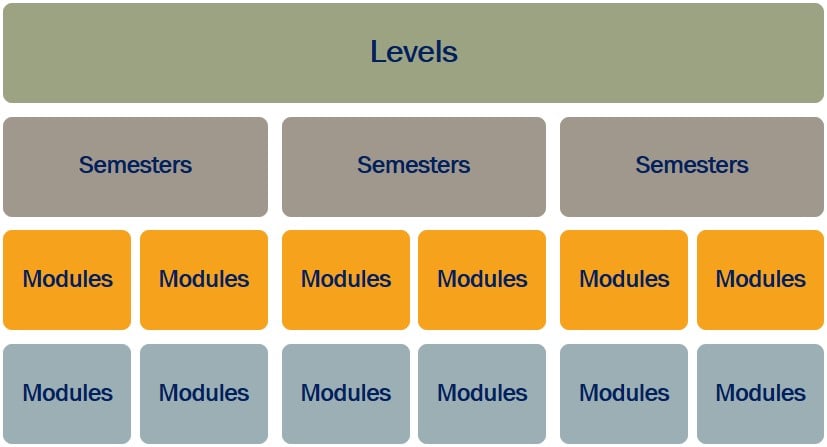
(A suggestive depiction of levels, semesters, and modules)
Curriculum Streams:
Curriculum streams are dedicated streams within the following list of disciplines, consisting of Islamic Studies and Arabic-centric subjects. Each curriculum stream comprises multiple modules, and each level of the Alimiyyah programme features a balanced dedication of modules from each stream.
Streams:
- Aqidah & Islamic Theology
- Quranic Studies
- Hadith Studies
- Fiqh & Contemporary Fiqh Studies
- Arabic Language*
- Seerah and Islamic History
- Logic (Mantiq)
- Tazkiyah Studies
- Tajwid & Hifz
- Western Studies
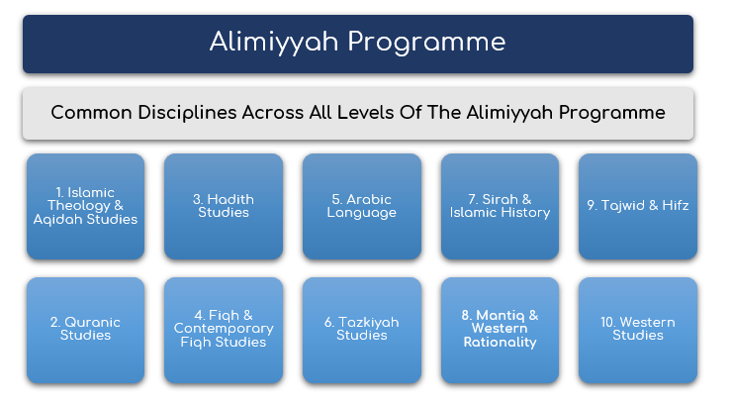
(Curriculum Stream of the Alimiyyah Programme)
* As a prerequisite before joining the Alimiyyah Programme, students are expected to know the Arabic alphabet & be able to read the Qur’an fluently.
Opportunities for Spiritual Growth:
Additionally, our program features flagship Tazkiyah-centric modules, meticulously designed to suit the diverse backgrounds and learning styles of our students. These modules integrate a harmonious blend of traditional wisdom and contemporary methodologies, facilitating not only the acquisition of knowledge but also the cultivation of spiritual well-being. By offering personalized guidance and resources, we aim to nurture a profound understanding of spirituality, enabling students to embark on a transformative journey towards holistic Islamic education and personal enlightenment.
Do both full-time and part-time students need to complete all four levels of the Alimiyyah program? Additionally what sets these two student types apart from each other?
Yes, whether a student is full-time or part-time, they all have to complete all four levels to finish their Alimiyyah program.
The difference between the two types of students lies in the duration of their completion. A part-time student completes their Alimiyyah in 16 semesters, spanning across 8 years, whereas a full-time student completes it in 10 semesters, spanning across 5 years.
- Regarding the difference between the 2 types of students:
For Full-Time students: the Alimiyyah Foundation, spanning two semesters; the Alimiyyah Intermediate, covering three semesters; the Alimiyyah Advanced, also comprising three semesters; and finally, the Daurah Hadith, which spans two semesters. Thus coming to a total of 10 semesters completed in 5 years.
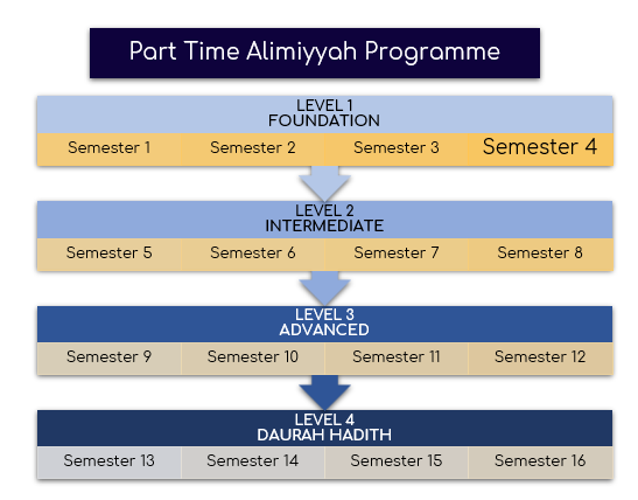
(Full-Time Alimiyyah Programme Track)
- For Part-Time students: the Alimiyyah program includes four semesters each for the Alimiyyah Foundation, Alimiyyah Intermediate, Alimiyyah Advanced, and Daurah Hadith, totaling 16 semesters completed over 8 years.
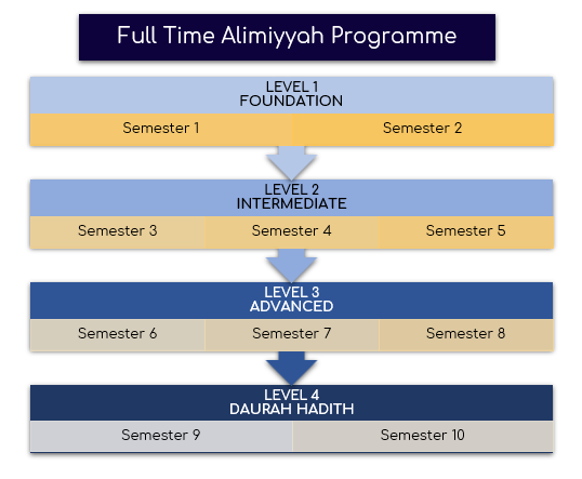
(Part-Time Alimiyyah Programme Track)
Why are full-time students able to complete their Alimiyyah program sooner than part-time students? Do both types of students cover the same modules in their program or do full-time students cover more, thus making their Alimiyyah more comprehensive?
Full-time students are able to complete their Alimiyyah program sooner than part-time students because they commit to a larger number of weekly hours for modules. Consequently, they cover more modules in a single semester.
Regarding the types of modules covered by the 2 different types of students, both types of students cover the same modules and content in their Alimiyyah Programme. We maintain consistency across both full-time and part-time students, ensuring that the syllabus remains uniform regardless of the mode of study.
How are the classes delivered? Additionally, is there any opportunity for direct interaction with scholars?
Classes are delivered live online and include a mix of tutorials, presentation-based lectures, textbook-based traditional lectures, seminars, and workshops. Recordings of these sessions are made available on DUA student’s learning portal for 24/7 access from both web browsers and the Mobile App.
Regarding direct interaction, Yes, students have the opportunity to join Al Balagh's Exclusive annual residential camp. This optional component allows for spiritual development through direct interaction with world-renowned scholars.
I think I’m at an advanced level as I have completed it partially in the past. What is the way forward?
The programme is exclusively tailored to provide students with an opportunity to develop advanced expertise in Islamic Sciences in a short period.
Currently, we are accepting applications for Level 1, but If you are interested in Level 2 or Level 3 and have prior qualification in the field based on prior study history in the Alimiyyah or Arabic programme from elsewhere, then kindly include information of your prior study subjects history in detail and attach the transcripts in the application. After receiving your application, our admission team will make a decision based on your merits and also arrange an assessment meeting after your enrollment to get you enrolled in the correct level/year of Alimiyyah Programme.
How long does it take for an advanced student to receive a decision on which level will be offered?
The final decision on which level will be offered, based on your assessment and prior examination record, can take weeks to complete due to the high influx of students during our enrollment weeks. Therefore, we encourage all students to apply as soon as possible to ensure timely processing of their applications.
I saw the timings on the website and I’m confused if it will suit my schedule/timezone. What do I do?
The timings listed on the website are primarily for beginner-level classes. However, for advanced students, class timings may vary and can be scheduled anywhere from 10 am to 9 pm UK time on Saturdays and Sundays. A more specific timetable will be shared closer to the launch date. Therefore, we recommend maintaining flexibility in your expectations regarding class timings.
If you find yourself unable to enroll in all the modules offered to you, there's no need to worry. You should select only those modules for which you can ensure a minimum of 50% live attendance. Modules where this commitment isn't feasible can be postponed to future semesters.
It's important to note that depending on the number of modules you choose to take per semester, your overall trajectory for completing the Alimiyyah programme will be affected. Therefore, we advise all students to carefully consider their module selection and its impact on their academic journey.
How are advanced classes determined in the Alimiyyah programme, and how does course selection work each semester?
Advanced classes in the Alimiyyah programme are suggested based on your proficiency assessment conducted during a meeting with the Evaluation & Assessment Team. Each semester offers Core and Elective Courses. The Evaluation & Assessment Team will provide guidance on course selection after thoroughly assessing your profile. Additionally, students have the opportunity to apply for exemption from core courses if they can demonstrate prior completion of these courses or possess the necessary level of knowledge.
I can't take all my classes on weekends. Can I draw some classes from weekdays?
Apologetically No. Students must remain in their designated track, either Weekend or Weekday, and are not permitted to mix classes between the two tracks. However, it is possible to switch tracks entirely, meaning a student who initially enrolled in the weekday track but wishes to shift to the weekend track can do so. However, such a shift must be done as soon as possible. Additionally, students should be aware of the starting months for each track:
- Weekday tracks start in February and September of every year
- Weekend tracks start in November and May of every year
(However, please note that occasional changes may occur in the launch dates. For the most recent launch dates or any updates, please feel free to contact our team for assistance.)
If students intend to switch from one track to another, they must do so at a time when the new semester for the intended track is set to begin.
Is the programme suitable for those unable to attend live sessions?
Unfortunately, the program does not accommodate students who are entirely unable to attend live sessions. However, all live sessions are meticulously recorded and promptly uploaded onto the DUA learning portal for convenient access. It is imperative for students to maintain at least 50% live attendance as we do not provide provisions for students who solely rely on recordings without any live participation or presence in the class. We strongly encourage and deem it necessary for students to have active participation and presence in live sessions, considering the sacredness and nature of the studies involved.
How many study hours do we have to dedicate as a part-time or a full-time student?
PART-TIME STUDENTS: For part-time students, we advise allocating specific hours per week / weekend for live classes. Additionally, we suggest dedicating additional time for revision and self-study.
- It's essential to recognize that each student possesses unique strengths and abilities, so their required study hours may vary accordingly.
|
Level |
Live Classes per week/weekend |
Revision & Self-Study |
|---|---|---|
|
1. (Alimiyyah Foundation) |
8-10 hrs |
5 hrs approximately |
|
2. (Alimiyyah Intermediate) |
15+ hrs |
5-7 hrs approximately |
|
3. (Alimiyyah Advanced) |
15+ hrs |
5-7 hrs approximately |
|
4. (Daurah Hadith) |
15+ hrs |
5-7+ hrs approximately |
FULL-TIME STUDENTS: For full-time students, we advise allocating specific hours per week / weekend for live classes. Additionally, we suggest dedicating additional time for revision and self-study.
- It's essential to recognize that each student possesses unique strengths and abilities, so their required study hours may vary accordingly.
|
Level |
Live Classes per week/weekend |
Revision & Self-Study |
|---|---|---|
|
1 (Alimiyyah Foundation) |
18-20 hrs |
7+ hrs approximately |
|
2 (Alimiyyah Intermediate) |
20+ hrs |
7-9 hrs approximately |
|
3 (Alimiyyah Advanced) |
20+ hrs |
7-9 hrs approximately |
|
4 (Daurah Hadith) |
15+ hrs |
10+ hrs approximately |
What are the exam categories on which my evaluation will be done?
Examinations can fall into 1 of 2 categories, depending on the discretion of the teacher and the subject type.
1) Self-Paced examinations: Students can start and finish the exam whenever they want within the set time frame. This means that you can take as much time as you need to complete the exam, or you can complete it quickly if you feel confident.
2) Timed examinations: Students shall be given a fixed amount of time to complete the exam. In timed examinations, students must manage their time carefully in order to complete all the questions within the allotted time frame. The exam is usually proctored and sufficient time shall be given for attempting the exam.
Here are further details:
- Assessments 1 & 2:
Online and self-paced assessments for Assessments 1 and 2 are conducted without live written or live verbal tests. These assessments are administered through the student Learning Management System (LMS) by the examination and administrative team. Students typically have an average of 3-4 weeks after the release date to attempt the assessments.
Syllabus Demarcation:
- The syllabus for Assessment 1 covers material from Week 1 to Week 5, though this timeline may slightly vary according to instructor discretion.
- Similarly, the syllabus for Assessment 2 encompasses material from Week 6 to Week 10, with potential variations based on instructor discretion.
Percentage Weightage Allocation:
- In terms of weightage, Assessment 1 accounts for 15% of the overall grade,
- While Assessment 2 carries a weightage of 25%.
2. For Final Exams:
For Final Exams, the examinations will be conducted online, live, and proctored. These exams are administered through the student Learning Management System (LMS) by the examination and administrative team.
Students are allotted an average of 2-3 hours per exam paper to attempt their exams in a proctored environment.
It's important to note that the camera must be turned on for the entire duration of the exam. Therefore, students need to have access to a camera and adequate audio for the exam.
Syllabus Demarcation:
The syllabus for the Final Exam covers material from Week 11 until the Concluding Week of the semester.
Percentage Weightage Allocation:
In terms of weightage, the Final Exam carries a significant weight of 60% towards the overall grade.
What are the attendance requirements and policies at the academy?
Attendance is crucial for success in our programs. Here's a brief overview of our attendance policies:
-
- Regular Attendance: We expect and encourage regular attendance for all classes. Attendance is recorded and factors into evaluations of responsibility, participation, and progress.
- Unauthorized Absences:
-
- Short-term: Missing class for two consecutive weeks without approval may result in temporary access revocation (temporary removal of the student's access to classes, course materials, LMS, or other educational resources until the issue is resolved).
- Extended: Four weeks of continuous unapproved absence leads to enrollment suspension. Re-admission is required to continue studies.
- Authorized Absences: For any planned absences, prior authorization is needed. Notify your support group in advance with valid reasons and necessary documentation.
- Subject-wise Attendance: A minimum of 50% live class attendance is required per subject to be eligible for final exams. This policy is strictly enforced, with regular attendance audits conducted by the administrative team to ensure compliance.
- Semester-wise Excused Absences: The policy regarding allowed excused absences varies based on the academic level of the students enrolled in the program.
- Level 1 students are permitted up to 50% excused absences,
- Level 2 students up to 30%, and
- Level 3 students up to 20%.
It's important to note that exceeding these allowable absences may result in disciplinary action being taken by higher management. This policy is in place to ensure that students maintain consistent attendance and engagement with their teachers and studies throughout their academic journey.
Emergency Absences: In emergencies, inform your support group/admin as soon as possible to make necessary accommodations and keep your academic progress on track.
When do I receive the Certificate/Ijazah?
The Alimiyyah programme is divided into 4 levels.
Upon successful completion of the first level, students will be awarded:
الشهادة الثانوية العامة في العلوم الإسلامية واللغة العربية
Upon successful completion of the second level, students will be awarded:
الشهادة الثانوية الخاصة في العلوم الإسلامية واللغة العربية
Upon successful completion of the third level, students will be awarded:
الشهادة العالية في العلوم الإسلامية واللغة العربية
Upon successful completion of the final level, students will be awarded:
الشهادة العالمية و الإجازة العالية في العلوم الإسلامية
When will I have access to the learning portal?
Upon successful enrollment, you will get access to DUA, Al Balagh Academy’s advanced online learning portal. Login details and important contact information will be provided to your registered email address. We recommend joining classes from a laptop/desktop computer for better visibility and learning experience.
Student access is of 2 types:
- Main class/batch access:
- Students get access to their batch's main class on the LMS within 24-72 hours.
- This section of the LMS includes various policies and guidelines essential for every student to read through, understand, and acknowledge.
- Module access:
- The second access type is for the specific modules for the semester that students have registered for.
- Every module will have its own access point, where class links, session summaries, notes, presentations, etc., will be uploaded as the weeks go by. This access is given after the orientation session week concludes.
Orientation session week: There will be an orientation week organized in the first week of the Programme to make students comfortable with the LMS platform, programme structure, schedule, instructors and peers. All support materials like the LMS Guide, Student Guidelines Handbook etc will be uploaded by the admins on the LMS for easier understanding.
Additionally, students enrolled in the Alimiyyah Programme will maintain access to their modules and related information on the Learning Management System (LMS) throughout their enrollment period. However, should a student withdraw or become unenrolled for the semester, access to their previous modules will be discontinued.
DUA - Darul Uloom AlBalagh
Can I access the course content at any time? And Is there a mobile app for accessing my courses?
The recordings of live sessions are uploaded onto our DUA student’s learning portal, providing 24/7 accessibility from both a web browser and the Al Balagh Academy Mobile App, enabling students to review and revise at their own pace and convenience.
Regarding a mobile App: Absolutely! We've got you covered for on-the-go learning with our newly updated mobile app. Gain maximum flexibility in your learning journey by accessing your courses anytime, anywhere. Simply click on the links below to download the latest Al Balagh Academy App tailored to your device:
- For Android users: Download from the Google Play Store
- For iOS users: Download from the App Store
Dive into a world of convenient and accessible learning today!
Do we have WhatsApp groups for communication?
Certainly! We've established a dedicated Student Support Group on WhatsApp to serve as your primary communication channel throughout your journey with us.
Following your Orientation week and completion of class selection, you'll be automatically added to your respective Module-wise "Groups" on the DUA Learning Portal. These groups will provide you with invaluable support and connectivity with fellow students, ensuring a smooth and enriching learning experience.
What is the structure of the onboarding programme?
Kindly note that we will be following these steps for completing the Al Balāgh Online ʿĀlimiyyah Programme Student Onboarding (after the official start date).
Step 1: Creation of WhatsApp Personal Support Group: A WhatsApp Personal Support Group will be established, with select members of the admin team added to assist you.
Step 2: Schedule Sharing: Students will be provided with their schedule based on the batch they have selected for enrollment.
Step 3: Access Provision: Upon schedule sharing, module-wise access will be granted. Modules will become visible on the DUA portal (https://dua.albalaghacademy.org/user_dashboard) within 1-2 days after the schedule has been shared.
Step 4: Module-Wise Groups: Module-specific groups will be available within the portal for each class. Students are encouraged to join these groups for class-related discussions after gaining access to their respective classes.
Support and Queries: Should you have any inquiries regarding the enrollment process or require assistance, feel free to reach out immediately within your support groups.
Scholarship Support: Al Balagh Academy values seekers of knowledge more than anything. Please visit here to apply for a scholarship. Our team will assess your application and respond in 2-3 working days.
What is the mentoring programme and who can participate in it?
We understand that pursuing Alimiyyah studies can present various challenges, despite the presence of dedicated support groups within our institution. Therefore, we take an extra step by offering individualized mentoring to ensure that our students receive the assistance they need to thrive academically, personally and spiritually. The mentoring programme is designed specifically for our Alimiyyah students, offering dedicated mentors throughout their semesters. These mentors provide personalized advice and guidance to students as they navigate through their academic journey.
Additionally, there are no additional fees required for accessing mentoring services. Mentoring support is included as part of your enrollment in the Alimiyyah programme.
The areas in which the mentors can assist their mentees are as follows:
In today's fast-paced and demanding academic environment, ensuring the success and well-being of our students is a top priority.
- Mentors offer guidance on time management and coping strategies, reducing the risk of burnout and dropout rates.
- One-to-one mentoring provides personalized support, aiding students in navigating challenges more effectively.
- Mentoring sessions offer a confidential space for students to discuss concerns and learn healthy coping mechanisms.
- Mentors provide valuable insights for spiritual development, benefiting students in their educational journey.
- Guidance from mentors empowers students to overcome obstacles and stay committed to their academic pursuits.
Concerned about Flexibility?
We provide a 100% Money Back Guarantee for the First 4 Weeks. Join us today for a secure and enriching experience in Islamic learning!
You can review our Refund policy HERE!
Will I get notification for live sessions?
You will be able to view all course wise live session details including joining links on your DUA Portal calendar(students are advised to join classes from the LMS directly). If you find any difficulty with the link/calendar students are advised to contact their respective support groups; where our dedicated support team will ensure that their problem gets resolved at the earliest.
Regarding General Help:
1) If you have questions about your ongoing classes, assessment matters, or IT/technical issues, please reach out to us through your respective Support groups only. (Please Note: It may take 2-3 days for our team to resolve the issue due to the volume of students.)
2) If you're interested in joining a different course/programme and need information, please get in touch with our admission team:
Email support: [email protected]
WhatsApp Support: http://wa.me/447946835804
What are the foundational components of the Alimiyyah Programme, including its Curriculum Streams? Furthermore, could you elaborate on the distinctive avenues the program provides for spiritual growth?
The essential building blocks of the Alimiyyah program consist of:
- Levels:
The Alimiyyah programme is structured into four levels, each comprising multiple semesters. These levels form the foundational structure of the program, guiding students through increasingly advanced studies.
- Semesters:
A semester is a defined period of academic study, typically lasting around six months, during which students engage in focused study. Each level contains multiple semesters, providing a structured framework for progression. With two semesters per year, students advance through the program systematically.
- Modules:
Modules represent individual subjects or classes within each semester. These modules cover diverse topics such as Arabic Grammar, Fiqh, Quran Studies, Hadith Studies, and others.

(A suggestive depiction of levels, semesters, and modules)
Curriculum Streams:
Curriculum streams are dedicated streams within the following list of disciplines, consisting of Islamic Studies and Arabic-centric subjects. Each curriculum stream comprises multiple modules, and each level of the Alimiyyah programme features a balanced dedication of modules from each stream.
Streams:
- Aqidah & Islamic Theology
- Quranic Studies
- Hadith Studies
- Fiqh & Contemporary Fiqh Studies
- Arabic Language*
- Seerah and Islamic History
- Logic (Mantiq)
- Tazkiyah Studies
- Tajwid & Hifz
- Western Studies

(Curriculum Stream of the Alimiyyah Programme)
* As a prerequisite before joining the Alimiyyah Programme, students are expected to know the Arabic alphabet & be able to read the Qur’an fluently.
Opportunities for Spiritual Growth:
Additionally, our program features flagship Tazkiyah-centric modules, meticulously designed to suit the diverse backgrounds and learning styles of our students. These modules integrate a harmonious blend of traditional wisdom and contemporary methodologies, facilitating not only the acquisition of knowledge but also the cultivation of spiritual well-being. By offering personalized guidance and resources, we aim to nurture a profound understanding of spirituality, enabling students to embark on a transformative journey towards holistic Islamic education and personal enlightenment.
Do both full-time and part-time students need to complete all four levels of the Alimiyyah program? Additionally what sets these two student types apart from each other?
Yes, whether a student is full-time or part-time, they all have to complete all four levels to finish their Alimiyyah program.
The difference between the two types of students lies in the duration of their completion. A part-time student completes their Alimiyyah in 16 semesters, spanning across 8 years, whereas a full-time student completes it in 10 semesters, spanning across 5 years.
- Regarding the difference between the 2 types of students:
For Full-Time students: the Alimiyyah Foundation, spanning two semesters; the Alimiyyah Intermediate, covering three semesters; the Alimiyyah Advanced, also comprising three semesters; and finally, the Daurah Hadith, which spans two semesters. Thus coming to a total of 10 semesters completed in 5 years.

(Full-Time Alimiyyah Programme Track)
- For Part-Time students: the Alimiyyah program includes four semesters each for the Alimiyyah Foundation, Alimiyyah Intermediate, Alimiyyah Advanced, and Daurah Hadith, totaling 16 semesters completed over 8 years.

(Part-Time Alimiyyah Programme Track)
Why are full-time students able to complete their Alimiyyah program sooner than part-time students? Do both types of students cover the same modules in their program or do full-time students cover more, thus making their Alimiyyah more comprehensive?
Full-time students are able to complete their Alimiyyah program sooner than part-time students because they commit to a larger number of weekly hours for modules. Consequently, they cover more modules in a single semester.
Regarding the types of modules covered by the 2 different types of students, both types of students cover the same modules and content in their Alimiyyah Programme. We maintain consistency across both full-time and part-time students, ensuring that the syllabus remains uniform regardless of the mode of study.
How are the classes delivered? Additionally, is there any opportunity for direct interaction with scholars?
Classes are delivered live online and include a mix of tutorials, presentation-based lectures, textbook-based traditional lectures, seminars, and workshops. Recordings of these sessions are made available on DUA student’s learning portal for 24/7 access from both web browsers and the Mobile App.
Regarding direct interaction, Yes, students have the opportunity to join Al Balagh's Exclusive annual residential camp. This optional component allows for spiritual development through direct interaction with world-renowned scholars.
I think I’m at an advanced level as I have completed it partially in the past. What is the way forward?
The programme is exclusively tailored to provide students with an opportunity to develop advanced expertise in Islamic Sciences in a short period.
Currently, we are accepting applications for Level 1, but If you are interested in Level 2 or Level 3 and have prior qualification in the field based on prior study history in the Alimiyyah or Arabic programme from elsewhere, then kindly include information of your prior study subjects history in detail and attach the transcripts in the application. After receiving your application, our admission team will make a decision based on your merits and also arrange an assessment meeting after your enrollment to get you enrolled in the correct level/year of Alimiyyah Programme.
How long does it take for an advanced student to receive a decision on which level will be offered?
The final decision on which level will be offered, based on your assessment and prior examination record, can take weeks to complete due to the high influx of students during our enrollment weeks. Therefore, we encourage all students to apply as soon as possible to ensure timely processing of their applications.
I saw the timings on the website and I’m confused if it will suit my schedule/timezone. What do I do?
The timings listed on the website are primarily for beginner-level classes. However, for advanced students, class timings may vary and can be scheduled anywhere from 10 am to 9 pm UK time on Saturdays and Sundays. A more specific timetable will be shared closer to the launch date. Therefore, we recommend maintaining flexibility in your expectations regarding class timings.
If you find yourself unable to enroll in all the modules offered to you, there's no need to worry. You should select only those modules for which you can ensure a minimum of 50% live attendance. Modules where this commitment isn't feasible can be postponed to future semesters.
It's important to note that depending on the number of modules you choose to take per semester, your overall trajectory for completing the Alimiyyah programme will be affected. Therefore, we advise all students to carefully consider their module selection and its impact on their academic journey.
How are advanced classes determined in the Alimiyyah programme, and how does course selection work each semester?
Advanced classes in the Alimiyyah programme are suggested based on your proficiency assessment conducted during a meeting with the Evaluation & Assessment Team. Each semester offers Core and Elective Courses. The Evaluation & Assessment Team will provide guidance on course selection after thoroughly assessing your profile. Additionally, students have the opportunity to apply for exemption from core courses if they can demonstrate prior completion of these courses or possess the necessary level of knowledge.
I can't take all my classes on weekends. Can I draw some classes from weekdays?
Apologetically No. Students must remain in their designated track, either Weekend or Weekday, and are not permitted to mix classes between the two tracks. However, it is possible to switch tracks entirely, meaning a student who initially enrolled in the weekday track but wishes to shift to the weekend track can do so. However, such a shift must be done as soon as possible. Additionally, students should be aware of the starting months for each track:
- Weekday tracks start in February and September of every year
- Weekend tracks start in November and May of every year
(However, please note that occasional changes may occur in the launch dates. For the most recent launch dates or any updates, please feel free to contact our team for assistance.)
If students intend to switch from one track to another, they must do so at a time when the new semester for the intended track is set to begin.
Is the programme suitable for those unable to attend live sessions?
Unfortunately, the program does not accommodate students who are entirely unable to attend live sessions. However, all live sessions are meticulously recorded and promptly uploaded onto the DUA learning portal for convenient access. It is imperative for students to maintain at least 50% live attendance as we do not provide provisions for students who solely rely on recordings without any live participation or presence in the class. We strongly encourage and deem it necessary for students to have active participation and presence in live sessions, considering the sacredness and nature of the studies involved.
How many study hours do we have to dedicate as a part-time or a full-time student?
PART-TIME STUDENTS: For part-time students, we advise allocating specific hours per week / weekend for live classes. Additionally, we suggest dedicating additional time for revision and self-study.
- It's essential to recognize that each student possesses unique strengths and abilities, so their required study hours may vary accordingly.
|
Level |
Live Classes per week/weekend |
Revision & Self-Study |
|---|---|---|
|
1. (Alimiyyah Foundation) |
8-10 hrs |
5 hrs approximately |
|
2. (Alimiyyah Intermediate) |
15+ hrs |
5-7 hrs approximately |
|
3. (Alimiyyah Advanced) |
15+ hrs |
5-7 hrs approximately |
|
4. (Daurah Hadith) |
15+ hrs |
5-7+ hrs approximately |
FULL-TIME STUDENTS: For full-time students, we advise allocating specific hours per week / weekend for live classes. Additionally, we suggest dedicating additional time for revision and self-study.
- It's essential to recognize that each student possesses unique strengths and abilities, so their required study hours may vary accordingly.
|
Level |
Live Classes per week/weekend |
Revision & Self-Study |
|---|---|---|
|
1 (Alimiyyah Foundation) |
18-20 hrs |
7+ hrs approximately |
|
2 (Alimiyyah Intermediate) |
20+ hrs |
7-9 hrs approximately |
|
3 (Alimiyyah Advanced) |
20+ hrs |
7-9 hrs approximately |
|
4 (Daurah Hadith) |
15+ hrs |
10+ hrs approximately |
What are the exam categories on which my evaluation will be done?
Examinations can fall into 1 of 2 categories, depending on the discretion of the teacher and the subject type.
1) Self-Paced examinations: Students can start and finish the exam whenever they want within the set time frame. This means that you can take as much time as you need to complete the exam, or you can complete it quickly if you feel confident.
2) Timed examinations: Students shall be given a fixed amount of time to complete the exam. In timed examinations, students must manage their time carefully in order to complete all the questions within the allotted time frame. The exam is usually proctored and sufficient time shall be given for attempting the exam.
Here are further details:
- Assessments 1 & 2:
Online and self-paced assessments for Assessments 1 and 2 are conducted without live written or live verbal tests. These assessments are administered through the student Learning Management System (LMS) by the examination and administrative team. Students typically have an average of 3-4 weeks after the release date to attempt the assessments.
Syllabus Demarcation:
- The syllabus for Assessment 1 covers material from Week 1 to Week 5, though this timeline may slightly vary according to instructor discretion.
- Similarly, the syllabus for Assessment 2 encompasses material from Week 6 to Week 10, with potential variations based on instructor discretion.
Percentage Weightage Allocation:
- In terms of weightage, Assessment 1 accounts for 15% of the overall grade,
- While Assessment 2 carries a weightage of 25%.
2. For Final Exams:
For Final Exams, the examinations will be conducted online, live, and proctored. These exams are administered through the student Learning Management System (LMS) by the examination and administrative team.
Students are allotted an average of 2-3 hours per exam paper to attempt their exams in a proctored environment.
It's important to note that the camera must be turned on for the entire duration of the exam. Therefore, students need to have access to a camera and adequate audio for the exam.
Syllabus Demarcation:
The syllabus for the Final Exam covers material from Week 11 until the Concluding Week of the semester.
Percentage Weightage Allocation:
In terms of weightage, the Final Exam carries a significant weight of 60% towards the overall grade.
What are the attendance requirements and policies at the academy?
Attendance is crucial for success in our programs. Here's a brief overview of our attendance policies:
-
- Regular Attendance: We expect and encourage regular attendance for all classes. Attendance is recorded and factors into evaluations of responsibility, participation, and progress.
- Unauthorized Absences:
-
- Short-term: Missing class for two consecutive weeks without approval may result in temporary access revocation (temporary removal of the student's access to classes, course materials, LMS, or other educational resources until the issue is resolved).
- Extended: Four weeks of continuous unapproved absence leads to enrollment suspension. Re-admission is required to continue studies.
- Authorized Absences: For any planned absences, prior authorization is needed. Notify your support group in advance with valid reasons and necessary documentation.
- Subject-wise Attendance: A minimum of 50% live class attendance is required per subject to be eligible for final exams. This policy is strictly enforced, with regular attendance audits conducted by the administrative team to ensure compliance.
- Semester-wise Excused Absences: The policy regarding allowed excused absences varies based on the academic level of the students enrolled in the program.
- Level 1 students are permitted up to 50% excused absences,
- Level 2 students up to 30%, and
- Level 3 students up to 20%.
It's important to note that exceeding these allowable absences may result in disciplinary action being taken by higher management. This policy is in place to ensure that students maintain consistent attendance and engagement with their teachers and studies throughout their academic journey.
Emergency Absences: In emergencies, inform your support group/admin as soon as possible to make necessary accommodations and keep your academic progress on track.
When do I receive the Certificate/Ijazah?
The Alimiyyah programme is divided into 4 levels.
Upon successful completion of the first level, students will be awarded:
الشهادة الثانوية العامة في العلوم الإسلامية واللغة العربية
Upon successful completion of the second level, students will be awarded:
الشهادة الثانوية الخاصة في العلوم الإسلامية واللغة العربية
Upon successful completion of the third level, students will be awarded:
الشهادة العالية في العلوم الإسلامية واللغة العربية
Upon successful completion of the final level, students will be awarded:
الشهادة العالمية و الإجازة العالية في العلوم الإسلامية
When will I have access to the learning portal?
Upon successful enrollment, you will get access to DUA, Al Balagh Academy’s advanced online learning portal. Login details and important contact information will be provided to your registered email address. We recommend joining classes from a laptop/desktop computer for better visibility and learning experience.
Student access is of 2 types:
- Main class/batch access:
- Students get access to their batch's main class on the LMS within 24-72 hours.
- This section of the LMS includes various policies and guidelines essential for every student to read through, understand, and acknowledge.
- Module access:
- The second access type is for the specific modules for the semester that students have registered for.
- Every module will have its own access point, where class links, session summaries, notes, presentations, etc., will be uploaded as the weeks go by. This access is given after the orientation session week concludes.
Orientation session week: There will be an orientation week organized in the first week of the Programme to make students comfortable with the LMS platform, programme structure, schedule, instructors and peers. All support materials like the LMS Guide, Student Guidelines Handbook etc will be uploaded by the admins on the LMS for easier understanding.
Additionally, students enrolled in the Alimiyyah Programme will maintain access to their modules and related information on the Learning Management System (LMS) throughout their enrollment period. However, should a student withdraw or become unenrolled for the semester, access to their previous modules will be discontinued.
DUA - Darul Uloom AlBalagh
Can I access the course content at any time? And Is there a mobile app for accessing my courses?
The recordings of live sessions are uploaded onto our DUA student’s learning portal, providing 24/7 accessibility from both a web browser and the Al Balagh Academy Mobile App, enabling students to review and revise at their own pace and convenience.
Regarding a mobile App: Absolutely! We've got you covered for on-the-go learning with our newly updated mobile app. Gain maximum flexibility in your learning journey by accessing your courses anytime, anywhere. Simply click on the links below to download the latest Al Balagh Academy App tailored to your device:
- For Android users: Download from the Google Play Store
- For iOS users: Download from the App Store
Dive into a world of convenient and accessible learning today!
Do we have WhatsApp groups for communication?
Certainly! We've established a dedicated Student Support Group on WhatsApp to serve as your primary communication channel throughout your journey with us.
Following your Orientation week and completion of class selection, you'll be automatically added to your respective Module-wise "Groups" on the DUA Learning Portal. These groups will provide you with invaluable support and connectivity with fellow students, ensuring a smooth and enriching learning experience.
What is the structure of the onboarding programme?
Kindly note that we will be following these steps for completing the Al Balāgh Online ʿĀlimiyyah Programme Student Onboarding (after the official start date).
Step 1: Creation of WhatsApp Personal Support Group: A WhatsApp Personal Support Group will be established, with select members of the admin team added to assist you.
Step 2: Schedule Sharing: Students will be provided with their schedule based on the batch they have selected for enrollment.
Step 3: Access Provision: Upon schedule sharing, module-wise access will be granted. Modules will become visible on the DUA portal (https://dua.albalaghacademy.org/user_dashboard) within 1-2 days after the schedule has been shared.
Step 4: Module-Wise Groups: Module-specific groups will be available within the portal for each class. Students are encouraged to join these groups for class-related discussions after gaining access to their respective classes.
Support and Queries: Should you have any inquiries regarding the enrollment process or require assistance, feel free to reach out immediately within your support groups.
Scholarship Support: Al Balagh Academy values seekers of knowledge more than anything. Please visit here to apply for a scholarship. Our team will assess your application and respond in 2-3 working days.
What is the mentoring programme and who can participate in it?
We understand that pursuing Alimiyyah studies can present various challenges, despite the presence of dedicated support groups within our institution. Therefore, we take an extra step by offering individualized mentoring to ensure that our students receive the assistance they need to thrive academically, personally and spiritually. The mentoring programme is designed specifically for our Alimiyyah students, offering dedicated mentors throughout their semesters. These mentors provide personalized advice and guidance to students as they navigate through their academic journey.
Additionally, there are no additional fees required for accessing mentoring services. Mentoring support is included as part of your enrollment in the Alimiyyah programme.
The areas in which the mentors can assist their mentees are as follows:
In today's fast-paced and demanding academic environment, ensuring the success and well-being of our students is a top priority.
- Mentors offer guidance on time management and coping strategies, reducing the risk of burnout and dropout rates.
- One-to-one mentoring provides personalized support, aiding students in navigating challenges more effectively.
- Mentoring sessions offer a confidential space for students to discuss concerns and learn healthy coping mechanisms.
- Mentors provide valuable insights for spiritual development, benefiting students in their educational journey.
- Guidance from mentors empowers students to overcome obstacles and stay committed to their academic pursuits.
Concerned about Flexibility?
We provide a 100% Money Back Guarantee for the First 4 Weeks. Join us today for a secure and enriching experience in Islamic learning!
You can review our Refund policy HERE!
Will I get notification for live sessions?
You will be able to view all course wise live session details including joining links on your DUA Portal calendar(students are advised to join classes from the LMS directly). If you find any difficulty with the link/calendar students are advised to contact their respective support groups; where our dedicated support team will ensure that their problem gets resolved at the earliest.
Regarding General Help:
1) If you have questions about your ongoing classes, assessment matters, or IT/technical issues, please reach out to us through your respective Support groups only. (Please Note: It may take 2-3 days for our team to resolve the issue due to the volume of students.)
2) If you're interested in joining a different course/programme and need information, please get in touch with our admission team:
Email support: [email protected]
WhatsApp Support: http://wa.me/447946835804






